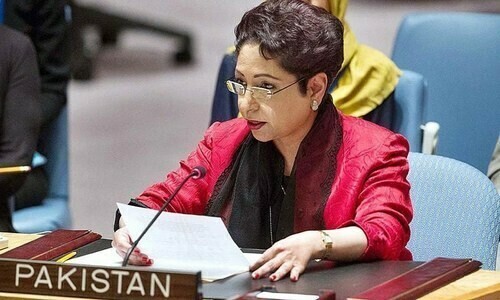There was a time when friends never waited for a bus or taxi but preferred to travel by foot from Ghora Gali to our village, Nag Tootial, in the Khyber Pakhtunkhwa part of Galiyat, some 20 kilometres away from the main Rawalpindi-Murree road. The walk home was mesmerising: the cool breeze blowing through the pine trees always created a unique whistling sound, there were countless birds in the wild, springs were dotted in the most unusual of places, and mountain foxes, monkeys and rabbits would be our companions.
Sadly, those days are gone; the area is now being mutilated by the stone-crushing mafia, who have ruthlessly, and for pure business purposes, wrought destruction upon the natural habitat of the area. As least 14 stone-crushing units are now operational in the entire belt, trees are being cut, green hills destroyed, while dust and unbearable noise greets you on the road and stays with you inside your homes. The natural springs and unique birds have all but disappeared, and the incidence of disease is reportedly on the rise.
Stone-crushing machines have sprung up on roadsides and an industry-like situation has also brutally damaged the road network, on which billions of taxpayer money has already been expended. Another stone-crushing unit is being set up near Dunna village by the same ‘mafia’.
Despite its protected status, Abbottabad’s picturesque and forested Galiyat is falling prey to a stone-crushing ‘mafia’
Village elders on the KP side remain adamant, however, that their government is aware of the illegality of the way in which the stone-crushing business is being carried out, but due to unknown reasons, it has decided to maintain silence. Under the law of the land, it is necessary for stone-crushers to have dust and noise control units available on site, but these regulations are being ignored with impunity too.
It shouldn’t have come to this point to begin with, since the entire area has environmental protection since the days of President Ayub Khan.
 |
| A stone-cutting machine at work |
“General Ayub Khan was fond of the Galiyat belt, specially the area surrounding Khanaspur, now commonly known as Ayubia,” explained a now retired senior official of the forest department some years ago. “One day, he was passing through Ghora Gali with one of his close aides, late Sardar Inayat Ur Rehman Khan Abbasi of Nagri Totial. Abbasi wished that the area from Ghora Gali to Lora (a union council in the adjoining Abbottabad district) and from Lora to Changla Gali via Nagri Totial, should be turned into a green belt and be preserved by the forest department so that the natural beauty of the area remains intact.”
The president ordered the forest department to immediately start horticultural work in the entire Galiyat belt. A nursery was developed near Nagri Totial, and Ayubia National Park was established. The forest department also planted a vast number of pine and other trees on the green top hills from Maloot to Lora, and unofficially also declared Rutti Mitti and the Burnalla Bridge on Lora road as a preserved area.
As least 14 stone-crushing units are now operational in the entire belt, trees are being cut, green hills destroyed, while dust and unbearable noise greets you on the road and stays with you inside your homes.
Today, those tiny saplings have grown tall, dotting the route between Ghora Gali to Lora with their immense beauty. Locals wholeheartedly supported the idea, and avoided any deforestation attempts. Except, they didn’t calculate the rise of the illegal stone-crushing business.
 |
| A stone-cutting shaft |
“The Pakistan Environmental Protection Act (PEPA)-1997 requires owners of stone-crushing plants to submit an initial environmental impact assessment to the Environmental Protection Agency (EPA) before commencing any project,” explains a senior officer of the KP environment department, speaking on condition of anonymity.
“The owners can only operate their stone-crushing units once the EPA has issued a no-objection certificate (NOC). In practice, the law is being violated as many stone crushers start operations without any permission or license,” claims the senior officer. Besides the environment department, he places the responsibility of upholding the law on the minerals development department and the industries department. “The Minerals Development department of the provincial government is responsible for shutting down all illegal plants,” he firmly asserts.
In truth, the Ghora Gali-Lora road falls between Punjab and Khyber Pakhtunkhwa, making it the responsibility of both provincial governments to curb this illegal activity in their respective areas of jurisdiction.
Sources within the Abbottabad district government claim that the stone-crushing units were stopped once and their NOCs were cancelled, but the KP government allowed them to do business nevertheless. As per the law, sources add, no Peshawar-based authority can allow permission for these activities, as this power rests only with the district government.
When contacted, Abbottabad Deputy Commissioner retired Capt Khalid Mehmood explained that he had only recently assumed charge, and as such, could not comment on the exact on-site situation. “If these stone-crushing units are not acting in accordance with the law, they shall be shut down immediately. Rest assured that the local administration will not favour or support any illegal activities or law violators in the district,” assures Mehmood.
On the other hand, deputy director of industries in Abbottabad, Mr Shehzad, disclosed that about 20 stone-crushing units operate on site. He explained that on receiving complaints from some citizens, the industries department has issued show-cause notices to these units, with express directions to install noise and dust pollution units or else have their licenses cancelled. “We are very clear on the matter, and we know that these units are operating without fulfilling the required safety measures,” claims Shehzad.
While acknowledging the threat posed by the stone-crushing units to the environment and public health, Industries Director Akhunzada Anwar Khan claimed that his department only issues permits after all requirements have been met. But he also saw a benefit to these units: “These units are also necessary for development, since stone is used in the construction industry. They also provide employment. I am also of the view that such activities must be within limits, and under rules and regulations.”
The widespread environmental degradation and abuse of law points to another reality: public interest litigation. “Weak regulation of the stone-crushing business has always been a big concern for the public,” argues Barrister M. Mumtaz Ali. “In some public interest litigation, superior courts have taken cognisance of the violation of environmental laws, but still, a lot more needs to be done.”
Elders of the area have conceded defeat in getting illegal stone-crushing stopped but social activist Sardar Wasiq Salim Abbasi says that he has already consulted lawyers and soon the Supreme Court would be moved for intervention.
“The entire road on which billions of rupees have been spent by the government has been completely damaged by these stone-crushing units. Dumpers are operating day and night; there is noise every hour of the day.
This area has turned into the most polluted area of Abbottabad,” maintains Abbasi.
Published in Dawn, Sunday Magazine, November 23rd, 2014














































